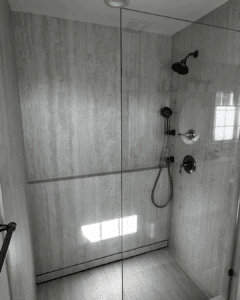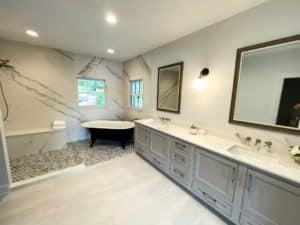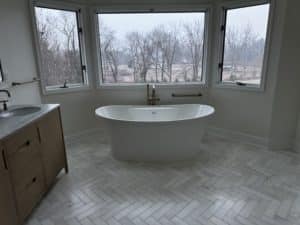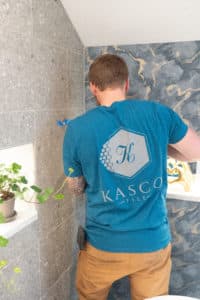Why Bathroom Tile Selection Matters for Your Renovation
When it comes to bathroom renovations, few decisions impact both the aesthetic appeal and functionality of your space more than tile selection. As a leading tile installation service in NJ, I’ve helped countless homeowners transform their bathrooms from outdated spaces into stunning personal retreats. The right tile can dramatically elevate your bathroom’s appearance while providing the durability needed in these high-moisture environments.
Over my years in the industry, I’ve witnessed how proper installation is equally as important as selecting quality materials. Even the most expensive tile will fail prematurely if not installed correctly. This is especially true in New Jersey homes, where seasonal humidity fluctuations can affect bathroom environments significantly.
My team and I take pride in guiding homeowners through both the selection and installation processes. Let me share what I’ve learned about creating beautiful, lasting bathroom tile installations that stand up to the test of time.
What Are The Best Shower Tile Options For New Jersey Homes?

New Jersey’s variable climate, with humid summers and dry winters, creates unique considerations for shower tile selection. Our team of professional tile installers in NJ recommends options that can handle these fluctuations while maintaining their appearance.
Porcelain tile stands as my top recommendation for most shower installations. Unlike ceramic, porcelain has a lower absorption rate (under 0.5%), making it exceptionally resistant to the daily moisture exposure in shower environments. It’s also dense enough to resist the micro-cracking that can occur with seasonal temperature changes common in New Jersey.
Natural stone options like marble and travertine offer unmatched elegance but require additional maintenance considerations. These materials need proper sealing upon installation and regular resealing to prevent water absorption and staining.
Comparison of Shower Tile Materials
| Tile Type | Water Resistance | Maintenance | Durability | Cost |
|---|---|---|---|---|
| Porcelain | Excellent | Low | High | Moderate |
| Ceramic | Good | Low | Moderate | Low-Moderate |
| Marble | Fair (requires sealing) | High | Moderate | High |
| Glass | Excellent | Moderate | Moderate | Moderate-High |
| Limestone | Poor (requires sealing) | High | Low-Moderate | Moderate-High |
Regarding size, large-format tiles (12″×24″ or larger) continue to be popular among NJ homeowners. They create fewer grout lines, resulting in easier cleaning and a more spacious visual effect. However, these larger tiles require perfect substrate preparation to prevent lippage and cracking.
For shower floors, I typically recommend smaller tiles (2″×2″ or similar mosaics) that provide better slip resistance and can be properly sloped toward the drain. The best tile installers in NJ understand how to create the proper slope while maintaining a visually pleasing installation.
How To Choose The Perfect Bathroom Floor Tiles

Safety should be your primary consideration when selecting bathroom floor tiles. As tile installation contractors in NJ, we guide clients toward options with appropriate slip-resistance ratings, particularly for households with children or older adults.
Look for tiles with a coefficient of friction (COF) rating of 0.42 or higher for bathroom floors. This measurement indicates how slip-resistant the tile will be when wet, a crucial factor in bathroom environments.
Size considerations matter significantly based on your bathroom’s dimensions. For smaller bathrooms, I often recommend tiles in the 12″×12″ range, which provide a good balance between visual appeal and installation practicality. Larger bathrooms can accommodate bigger formats (18″×18″ or larger), creating a more seamless look with fewer grout lines.
Maintenance Considerations for Bathroom Floor Tiles
Porcelain remains my go-to recommendation for most bathroom floors due to its exceptional durability and minimal maintenance requirements. Textured finishes provide better slip resistance without significantly increasing cleaning difficulty.
Glazed ceramic offers a budget-friendly alternative with good performance, though it typically isn’t as dense or durable as porcelain. For natural stone enthusiasts, properly sealed granite provides excellent durability with moderate maintenance requirements.
Remember that darker grout shows less staining over time, making it practical for floor applications. However, with professional installation and proper sealing, even lighter grout can maintain its appearance with regular cleaning.
Which Bathroom Wall Tile Options Maximize Visual Impact?

Creating statement walls has become one of our most requested services. Our tile installation company in NJ specializes in designing accent walls that transform ordinary bathrooms into showcase spaces.
Subway tiles continue their reign of popularity, but with modern twists. I’m seeing increased interest in elongated subway formats (4″×12″ or 4″×16″), handmade-look options with slight irregularities, and dimensional subway tiles that create shadow effects.
The orientation of your tiles dramatically affects the perceived dimensions of your space. Vertical installations draw the eye upward, making ceilings appear higher, while horizontal patterns visually widen a room. This simple change in orientation can transform how your bathroom feels without changing the tile itself.
Mixing Tile Types for Designer Effects
Combining different tile materials creates dynamic visual interest that elevates any bathroom design. Consider using:
- Porcelain for the majority of wall surfaces
- Glass accent strips to introduce color and reflectivity
- Decorative ceramics as feature bands
- Natural stone as a focal point around key fixtures
When planning these combinations, I recommend limiting your palette to 2-3 complementary materials to maintain cohesion. Proper transitions between different tile types require precise cutting and planning, which is why many NJ tile installation contractors specialize in these custom designs.
What Installation Patterns Can Transform Your Bathroom Tiles?

Installation pattern selection dramatically impacts your bathroom’s final appearance, often more than the tile itself. When you hire the best tile installers in NJ, complex patterns become possible without compromising installation quality.
The classic straight lay (grid pattern) offers timeless simplicity and typically involves the least waste and labor. For more visual interest, consider offset patterns where each row of tiles is shifted by a third or half of the tile’s length, creating a more dynamic appearance.
Herringbone installations have surged in popularity for both floor and wall applications. This pattern creates dramatic visual movement and can make smaller spaces appear larger. However, it requires significantly more cutting and precision than standard layouts.
Popular Tile Patterns and Their Difficulty Ratings
| Pattern | Visual Impact | Installation Difficulty | Waste Factor | Best For |
|---|---|---|---|---|
| Grid | Low | Easy | Low | Large-format tiles |
| 50% Offset | Medium | Moderate | Low | Subway tiles |
| Herringbone | High | Difficult | High | Adding visual interest |
| Basketweave | High | Difficult | Medium | Classic bathrooms |
| Chevron | Very High | Very Difficult | High | Statement walls |
For smaller bathrooms, I generally recommend simpler patterns that don’t overwhelm the space. Larger bathrooms can support more complex designs like herringbone or basketweave without appearing too busy.
Remember that more complex patterns typically increase both material costs (due to additional cutting waste) and labor costs. However, the visual impact often justifies this investment for many homeowners seeking distinctive designs.
Common Bathroom Tile Installation Challenges And How We Solve Them
Older homes throughout New Jersey present unique challenges for bathroom renovations. NJ tile installation contractors like us must address these regional challenges to ensure lasting results.
Uneven subfloors rank among the most common issues we encounter, particularly in historic homes. Rather than taking shortcuts, we meticulously level these surfaces using appropriate underlayment systems before tile installation begins. This critical step prevents future cracking and lippage that would otherwise be inevitable.
Creating proper shower slopes requires particular expertise. The industry standard calls for a 1/4 inch drop per foot toward the drain, which must be precisely executed to ensure proper drainage without creating an uncomfortable standing surface. We achieve this through traditional mud-bed techniques or modern linear drain systems, depending on the project requirements.
Waterproofing Solutions for New Jersey Homes
Proper waterproofing is non-negotiable in bathroom installations. We implement comprehensive systems that include:
- Crack isolation membranes to prevent substrate movement from affecting tiles
- Sheet membranes or liquid waterproofing for shower walls and floors
- Specialized treatments for transition areas and penetration points
- Vapor barriers appropriate to the specific conditions of your home
These moisture management systems are especially important in New Jersey’s climate, where seasonal humidity fluctuations can stress conventional waterproofing methods.
How Much Time Does Professional Bathroom Tile Installation Take?
Timeline expectations often top the list of client questions. When researching “tile installation near me” in New Jersey, ask about realistic project durations rather than accepting overly optimistic estimates.
For a standard full bathroom renovation including shower, floor, and wall tile, I typically allocate 5-7 working days for the tile installation portion alone. This timeframe allows for proper substrate preparation, waterproofing, tile setting, and grouting with appropriate curing times between steps.
Factors that commonly extend timelines include discovery of hidden water damage, structural issues requiring remediation, and complex installation patterns. Custom mosaic work or intricate designs naturally require additional time to execute properly.
The most crucial phase actually comes after installation: proper curing. I advise clients to allow a minimum of 24-48 hours before exposing new tile installations to water, and a full 7 days before subjecting grout to heavy cleaning or shower use. These waiting periods ensure your installation performs as intended for years to come.
What Should You Ask Before Hiring Tile Installation Services in NJ?
Protecting your investment starts with asking the right questions. As one of the trusted tile contractors in NJ, I encourage homeowners to thoroughly vet potential installers before making decisions.
Verify that any contractor you’re considering carries both liability insurance and workers’ compensation coverage specific to New Jersey regulations. Ask to see current certificates rather than taking verbal assurances, as these protections safeguard both your property and the workers involved.
Experience questions reveal true expertise more than general years in business. Ask specifically about similar projects they’ve completed, their approach to waterproofing, and how they handle transitions between different flooring materials.
Essential Questions for Potential Tile Installers
- How many bathroom tile installations do you complete annually?
- What waterproofing systems do you use and why?
- Will you handle material procurement, or should I purchase tiles?
- What preparation is required before you begin work?
- How do you handle waste removal and cleanup?
- What warranty do you provide on your installation work?
- Can you provide references from similar bathroom projects?
- What payment schedule do you require?
The answers to these questions often reveal more about a contractor’s professionalism than their marketing materials ever could. Quality tile installation companies NJ homeowners trust will answer confidently with specific details rather than generalities.
Why Professional Tile Installation in NJ Makes All the Difference
DIY tile projects often lead to costly repairs down the line. Without proper waterproofing techniques, moisture can penetrate behind tiles, causing mold growth and structural damage that isn’t immediately visible.
Professional tile installers in NJ bring specialized tools and techniques that ensure your bathroom can withstand years of daily use. We understand the proper substrate preparation required for different tile materials and the importance of precise measurements for a polished finish.
When searching for “tile installation near me” in New Jersey, look for contractors who specialize specifically in bathroom environments. The expertise required for a bathroom installation differs significantly from kitchen or entryway tile work due to waterproofing considerations.
Benefits of Hiring Professional Tile Installers vs. DIY
- Professional waterproofing systems that prevent costly water damage
- Perfectly level installations that prevent lippage and cracking
- Proper substrate preparation that ensures long-term durability
- Precise cutting for a clean finished appearance around fixtures
- Expert grout application that resists staining and moisture penetration
- Knowledge of expansion requirements to prevent tiles from cracking
Investing in professional installation typically saves money in the long run by preventing premature failures. The tile installation companies NJ homeowners trust most aren’t necessarily the cheapest, but rather those focused on quality workmanship.
The Kasco Tile LLC Difference: Our Bathroom Tile Installation Process

Our professional tile installation NJ service begins with a comprehensive consultation. I personally visit your home to measure the space, discuss your vision, and identify any potential challenges before they become problems during installation.
Material selection assistance represents a crucial aspect of our service. Rather than leaving you overwhelmed by endless options, we provide curated recommendations based on your aesthetic preferences, practical requirements, and budget considerations. We can either source materials directly or provide guidance if you prefer to purchase tiles yourself.
Our installation methodology follows a systematic approach that ensures quality at every stage:
- Thorough substrate evaluation and preparation
- Comprehensive waterproofing appropriate to the specific application
- Detailed layout planning with full-size dry layouts when appropriate
- Precision cutting and installation following industry best practices
- Careful grouting with appropriate products for each application
- Final sealing and protection of completed work
Throughout this process, we maintain rigorous quality control checkpoints. Each phase must meet our exacting standards before proceeding to the next step, ensuring the integrity of your finished installation.
Transform Your Bathroom with Expert Tile Installation
Selecting the perfect bathroom tiles represents just half the equation in creating a space that’s both beautiful and functional. For exceptional tile installation in NJ that transforms your bathroom, the expertise of your installer ultimately determines whether your vision becomes reality.
The right combination of quality materials and professional installation ensures your bathroom will remain beautiful and functional for years to come. From proper waterproofing to precise cuts around fixtures, these details make the difference between an ordinary renovation and an extraordinary one.
Remember that investing in professional installation typically saves money in the long run by preventing the costly repairs often required after DIY attempts or cut-rate installations. Your bathroom deserves the attention to detail and craftsmanship that only experienced professionals can provide.
Contact Kasco Tile today for a free consultation about your bathroom tile project. As NJ’s trusted tile installation experts, we’ll help you select the perfect tiles and ensure flawless installation that exceeds your expectations and stands the test of time.
